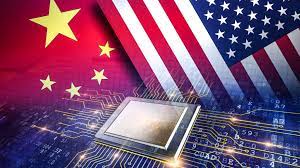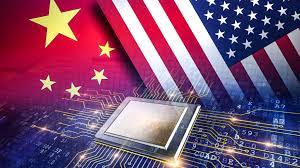
Beijing's decision to exclude US business Micron Technology Inc from supplying memory chips to critical domestic industries has heightened friction in a simmering trade war with Washington and boosted shares of companies that stand to benefit from the move.
China's cyberspace regulator announced late Sunday that Micron, the world's largest memory chipmaker, had failed its network security examination and that it would prohibit key infrastructure operators from purchasing from the company.
It did not say what hazards it had discovered or which of the company's goods might be affected.
Analysts said the decision would have little direct impact on Micron because most of its primary clients in China are consumer electronics businesses, but warned that it could push some companies to remove Micron goods from their supply chains owing to political risks.
Micron shares fell 5.5% in premarket trade on Monday, while other U.S. chipmakers with significant exposure to China, such as Qualcomm, Intel, and Broadcom, fell about 1%.
Washington protested Beijing's decision, but it also boosted the stocks of Micron's rivals in China and South Korea, which are expected to benefit as mainland enterprises seek memory chips from other sources.
"We firmly oppose restrictions that have no basis in fact," a spokesperson from the U.S. Commerce Department said in a statement on Sunday.
"This action, along with recent raids and targeting of other American firms, is inconsistent with (China's) assertions that it is opening its markets and committed to a transparent regulatory framework."
Tensions between Washington and Beijing have risen in recent months as a result of Chinese government raids and visits to U.S. business due diligence firm Mintz Group and management consulting firm Bain.
Micron announced on Sunday that it had received the regulator's review and that it "looked forward to continuing to engage in discussions with Chinese authorities."
The company is the first to be targeted by Beijing following a series of export limitations imposed by Washington on certain American components and chipmaking tools in order to prevent them from being used to boost China's military capabilities.
China initiated the assessment in late March, amid a semiconductor technology dispute and deteriorating relations between Washington and Beijing.
The move also comes just after the Group of Seven nations pledged to "de-risk, not decouple" economic engagement with China, and as US Vice President Joe Biden urged for a "open hotline" between Washington and Beijing.
The US Commerce Department stated that it would communicate directly with Chinese authorities to clarify their actions.
"We also will engage with key allies and partners to ensure we are closely coordinated to address distortions of the memory chip market caused by China's actions," the department said.
While the Chinese statement and state media stressed that the Micron decision should be viewed as an isolated instance involving national security considerations rather than geopolitics, noted Chinese pundit Hu Xijin took a different stance.
"Washington itself encourages US companies to do things that endanger China’s national security, so it suspects that Chinese companies are doing the same," the former editor-in-chief of nationalist state tabloid Global Times tweeted. "The whole world should be wary of the US."
Monday's announcement by China regarding its Micron probe helped lift shares in a few regional companies involved in chip manufacturing as state media claimed that domestic players would gain from the action.
Before trimming gains, shares of businesses like Gigadevice Semiconductors, Ingenic Semiconductor, and Shenzhen Kaifa Technology opened up between 3% and 8%.
Shares of Micron's main competitors increased as well, with Samsung Electronics and SK Hynix of South Korea up by 0.9% and 2.1%, respectively. After trimming their gains, they increased by 0.2% and 0.9% respectively as analysts anticipate no impact on Micron.
There were no comments from bBoth Samsung and SK Hynix.
"Since Micron's DRAM and NAND products are much less in servers, we believe most of its revenue in China is not generated from telcos and the government. Therefore, the ultimate impact on Micron will be quite limited," Jefferies said in a note.
Last year, $5 billion, or 16% of Micron's total revenue, came from China, including $1.7 billion from Hong Kong.
Given that Micron's exposure to the enterprise and cloud server category is very low, Bernstein said a 2% drop in sales was the most reasonable forecast.
Beijing has not specifically said which types of businesses these apply to, but has vaguely defined the industries it regards "critical" as ones as public communication and transportation.
China, the largest consumer of semiconductors in the world, has been working for several years to increase its domestic production of semiconductors.
(Source:www.usnews.com)
China's cyberspace regulator announced late Sunday that Micron, the world's largest memory chipmaker, had failed its network security examination and that it would prohibit key infrastructure operators from purchasing from the company.
It did not say what hazards it had discovered or which of the company's goods might be affected.
Analysts said the decision would have little direct impact on Micron because most of its primary clients in China are consumer electronics businesses, but warned that it could push some companies to remove Micron goods from their supply chains owing to political risks.
Micron shares fell 5.5% in premarket trade on Monday, while other U.S. chipmakers with significant exposure to China, such as Qualcomm, Intel, and Broadcom, fell about 1%.
Washington protested Beijing's decision, but it also boosted the stocks of Micron's rivals in China and South Korea, which are expected to benefit as mainland enterprises seek memory chips from other sources.
"We firmly oppose restrictions that have no basis in fact," a spokesperson from the U.S. Commerce Department said in a statement on Sunday.
"This action, along with recent raids and targeting of other American firms, is inconsistent with (China's) assertions that it is opening its markets and committed to a transparent regulatory framework."
Tensions between Washington and Beijing have risen in recent months as a result of Chinese government raids and visits to U.S. business due diligence firm Mintz Group and management consulting firm Bain.
Micron announced on Sunday that it had received the regulator's review and that it "looked forward to continuing to engage in discussions with Chinese authorities."
The company is the first to be targeted by Beijing following a series of export limitations imposed by Washington on certain American components and chipmaking tools in order to prevent them from being used to boost China's military capabilities.
China initiated the assessment in late March, amid a semiconductor technology dispute and deteriorating relations between Washington and Beijing.
The move also comes just after the Group of Seven nations pledged to "de-risk, not decouple" economic engagement with China, and as US Vice President Joe Biden urged for a "open hotline" between Washington and Beijing.
The US Commerce Department stated that it would communicate directly with Chinese authorities to clarify their actions.
"We also will engage with key allies and partners to ensure we are closely coordinated to address distortions of the memory chip market caused by China's actions," the department said.
While the Chinese statement and state media stressed that the Micron decision should be viewed as an isolated instance involving national security considerations rather than geopolitics, noted Chinese pundit Hu Xijin took a different stance.
"Washington itself encourages US companies to do things that endanger China’s national security, so it suspects that Chinese companies are doing the same," the former editor-in-chief of nationalist state tabloid Global Times tweeted. "The whole world should be wary of the US."
Monday's announcement by China regarding its Micron probe helped lift shares in a few regional companies involved in chip manufacturing as state media claimed that domestic players would gain from the action.
Before trimming gains, shares of businesses like Gigadevice Semiconductors, Ingenic Semiconductor, and Shenzhen Kaifa Technology opened up between 3% and 8%.
Shares of Micron's main competitors increased as well, with Samsung Electronics and SK Hynix of South Korea up by 0.9% and 2.1%, respectively. After trimming their gains, they increased by 0.2% and 0.9% respectively as analysts anticipate no impact on Micron.
There were no comments from bBoth Samsung and SK Hynix.
"Since Micron's DRAM and NAND products are much less in servers, we believe most of its revenue in China is not generated from telcos and the government. Therefore, the ultimate impact on Micron will be quite limited," Jefferies said in a note.
Last year, $5 billion, or 16% of Micron's total revenue, came from China, including $1.7 billion from Hong Kong.
Given that Micron's exposure to the enterprise and cloud server category is very low, Bernstein said a 2% drop in sales was the most reasonable forecast.
Beijing has not specifically said which types of businesses these apply to, but has vaguely defined the industries it regards "critical" as ones as public communication and transportation.
China, the largest consumer of semiconductors in the world, has been working for several years to increase its domestic production of semiconductors.
(Source:www.usnews.com)





